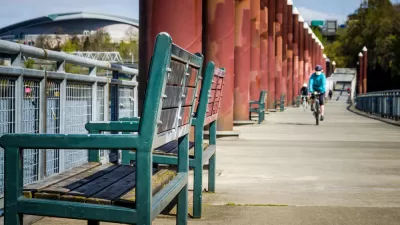Public comment closed earlier this week on the Oregon Department of Transportation's (ODOT) draft Bicycle and Pedestrian Plan. The plan has a ways to go before advocates, elected officials, and planners are on the same page.
"Staff from bike advocacy groups, from the Metro regional government and from the Portland office of the Oregon Department of Transportation are all pushing for significant changes to a document that will be the foundation of bicycle planning for the next quarter century," reports Michael Andersen.
The outpouring of concern is directed at the Oregon Department of Transportation's (ODOT) draft Bicycle and Pedestrian Plan, which recently closed a public comment period. "Among the points of contention: the plan doesn’t explicitly say that the state should be putting complete biking and walking facilities on highways like Southwest Barbur, Southeast Powell or Northeast Lombard," according to Andersen.
The article goes on to detail the comments of concern voiced by both advocacy groups and elected officials from the Portland-area regional government, Metro. Among the talking points in the debate is how the new plan compares to the previous state plan, approved in 1995. Critics of the new plan say it falls short of the standards established by the 1995 plan. ODOT Transportation Planning Manager Amanda Pietz is quoted in the story touting the new plan's attention to specific projects—something she says the 1995 plan lacked. The in-depth article includes a lot more detail about the plan and the debate that ensued during the plan's public comment period.
FULL STORY: Concerns mount over draft of state’s bike plan

Alabama: Trump Terminates Settlements for Black Communities Harmed By Raw Sewage
Trump deemed the landmark civil rights agreement “illegal DEI and environmental justice policy.”

Study: Maui’s Plan to Convert Vacation Rentals to Long-Term Housing Could Cause Nearly $1 Billion Economic Loss
The plan would reduce visitor accommodation by 25% resulting in 1,900 jobs lost.

Planetizen Federal Action Tracker
A weekly monitor of how Trump’s orders and actions are impacting planners and planning in America.

Waymo Gets Permission to Map SF’s Market Street
If allowed to operate on the traffic-restricted street, Waymo’s autonomous taxis would have a leg up over ride-hailing competitors — and counter the city’s efforts to grow bike and pedestrian on the thoroughfare.

Parklet Symposium Highlights the Success of Shared Spaces
Parklets got a boost during the Covid-19 pandemic, when the concept was translated to outdoor dining programs that offered restaurants a lifeline during the shutdown.

Federal Homelessness Agency Places Entire Staff on Leave
The U.S. Interagency Council on Homelessness is the only federal agency dedicated to preventing and ending homelessness.
Urban Design for Planners 1: Software Tools
This six-course series explores essential urban design concepts using open source software and equips planners with the tools they need to participate fully in the urban design process.
Planning for Universal Design
Learn the tools for implementing Universal Design in planning regulations.
Caltrans
Smith Gee Studio
Institute for Housing and Urban Development Studies (IHS)
City of Grandview
Harvard GSD Executive Education
Toledo-Lucas County Plan Commissions
Salt Lake City
NYU Wagner Graduate School of Public Service




























